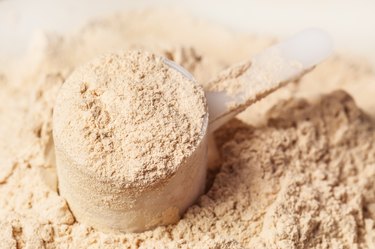
Daily protein needs vary based on factors like age, weight, sex and physical activity level. It can be difficult to know how much whey protein powder is in a heaping scoop.
Whey powders come in various flavor and forms. If you can meet your minimum daily protein requirements with food alone — and most Americans can — you aren't likely to need more than one scoop of isolate daily, and you may not need any at all.
Video of the Day
Video of the Day
What's Whey Protein Isolate?
Whey is a general term for the by-product of cheese manufacturing. Whey can contain up to 75 percent lactose. Unlike vegetable protein sources, whey is a complete protein because it supplies all the essential amino acids the body cannot produce on its own. In addition, whey contains a variety of vitamins and minerals.
There are three main forms of whey protein — whey powder, whey concentrate and whey isolate. Whey isolates contain the greatest concentration of protein at 90 percent or more says Dairy for Global Nutrition. And whey isolates contain less fat and lactose as a result of the method of processing, making it safe if you are lactose-intolerant. Whey protein isolate powders are used most in sports nutrition, but they are also found in infant formulas, baked goods, salad dressings and medical nutritional formulas.
How Much Whey Powder to Take
The Recommended Daily Allowance for protein is a minimum of 0.8 grams per kilogram of your body weight, says Sonya Angelone, a registered dietitian nutritionist at the Academy of Nutrition and Dietetics. However, the amount of isolate protein supplement you might require depends on your individual circumstances such as:
- If you are an athlete or body builder that requires extra protein
- If you had weight-loss surgery on a low calorie diet
- If you are a vegetarian that is finding it difficult to get enough complete protein
- If you are pregnant or breastfeeding
- How often you exercise
A scoop is typically used to measure the serving size of whey powder, but different brands may have different scoop sizes and not all have the same protein content. Before you take a whey supplement, carefully check the label for nutritional value and recommended dosage to make sure the product fits your needs.
According to Tom Venuto, personal trainer and certified strength and conditioning specialist, says in a typical 30-gram scoop, whey isolate may offer 26 grams of protein or more. If you weigh 150 pounds or less and are only moderately active, that's about half of your daily protein requirements, so it may not be necessary to take a full scoop.
The simplest way to determine how much whey isolate to use is to calculate your approximate daily protein needs, find out about how much protein you already eat every day and then subtract the second number from the first. By taking an inventory of the protein foods you eat every day, you can make an educated guess at how much protein you're getting and determine whether you need whey isolate. Write down what you eat, use an online nutrition calculator to calculate how much protein each food contains and take the average of each day's protein total.
Whey Protein for Weight Loss
Although a healthy diet and exercise is the best way to lose weight, whey protein powder may be beneficial as an appetite suppressant, perhaps in the form of a smoothie, to replace the calories of an average meal. containing as much as 20 to 30 grams of protein. Although isolate whey supplements are often fortified with a variety of vitamins and minerals, they do not provide fiber or antioxidants.
The American Journal of Clinical Nutrition published a study that investigated the effect of whey protein supplements on weight management. The conclusion found that, after weight loss in 220 participants, whey protein supplementation did not help with weight management success compared to normal dietary protein intake from food.
Do You Need Whey Protein Powder Supplements?
Whey isolate contains every amino acid that the human body needs and can't produce by itself, but there are many other foods that offer the same. All animal and milk based proteins, including red meat, poultry, eggs, fish, cheese and yogurt, provide those essential amino acids, as does plant based soy. In fact, the International Society of Sports Nutrition suggests that healthy people get their protein from whole food sources rather than supplements whenever possible because whole foods offer greater overall nutrition.
- Rice University: Protein Requirements for Athletes
- Journal of the International Society of Sports Nutrition: International Society of Sports Nutrition Position Stand -- Protein and Exercise
- The American Journal of Clinical Nutrition: Protein Supplements after Weight Loss do not Improve Weight Maintenance Compared with Recommended Dietary Protein Intake Despite Beneficial Effects on Appetite Sensation and Energy Expenditure: A Randomized, Controlled, Double-Blinded Trial
- Dairy for Global Nutrition: Whey Protein
- MILKingredients.ca:Whey Powder
- Ridgeview Medical Center: Protein Power (adapted from the Academy of Nutrition and Dietetics)